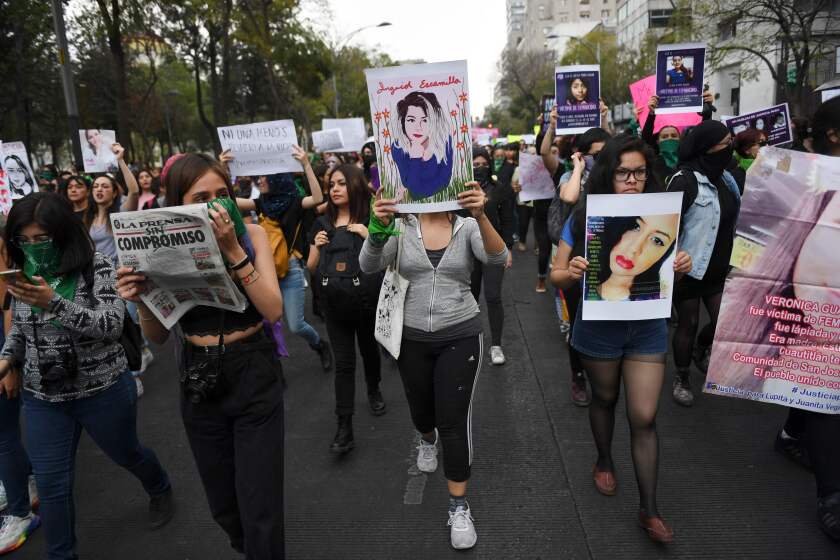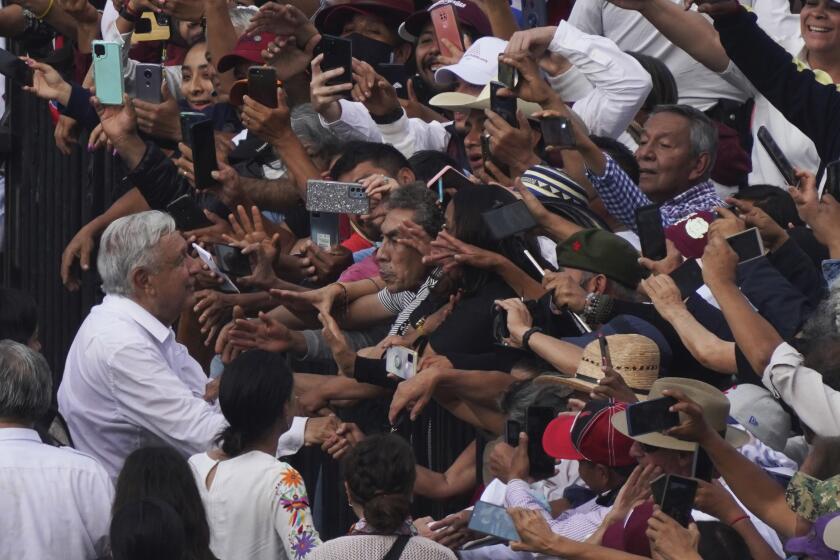This woman is the front-runner to be Mexico’s next president

- Share via
MEXICO CITY — The two appear an unlikely political pair: he a shopkeeper’s son from rural southern Mexico, she a globally recognized scientist from the capital.
He is outgoing and folksy, a larger-than-life figure comfortable pressing the flesh and mingling with crowds. Her reserved manner and lack of charisma feed the notion that she is distant and arrogant.
When it comes to their politics, however, it is difficult to distinguish Andrés Manuel López Obrador and Claudia Sheinbaum, whose long history together has uniquely positioned her to succeed him as the country’s president next year.
Sheinbaum, who would be the first woman to hold the job, has cast her candidacy as a victory for feminism.
“Mexico is no longer written with the M of machismo,” she told tens of thousands of supporters gathered in the capital this month as she resigned from her job as Mexico City mayor to formally enter the race for president. “But rather M for mother, for mujer” — woman.
But her anointment by López Obrador — who is widely known as AMLO — and her wholesale adoption of his policies, leftist ideology and even some of his speech patterns have led some pundits to wonder whether she is her own person.
“Claudia is not questioned for being a woman, but rather for mimicking a man and transforming herself to please AMLO,” tweeted Denise Dresser, a professor of political science at Autonomous Technological Institute of Mexico and fierce critic of the populist president. “Nothing is more contrary to the agenda of autonomy/feminine empowerment that marks a new generation of women.”
Despite spiraling violence and a stagnating economy, Mexican President Andrés Manuel López Obrador has maintained sky-high approval ratings because he speaks to the working poor.
The 60-year-old Sheinbaum would also be the first president from Mexico’s small Jewish community.
Though she spent two decades in academia before starting her political career, she comes from a tradition of political engagement.
Both her parents were active in the signature Mexican student movement of 1968, best known for the infamous Tlatelolco massacre in which Mexican security forces killed scores of protesters in the capital.
As a high schooler, Sheinbaum participated in protests against the exclusion of students, many of them poor, from higher education. As a student at the Autonomous University of Mexico, or UNAM, she was part of a movement against a plan to raise fees at the public institution.
And her first husband was a leader in Mexico’s Democratic Revolution Party, which was formed in 1989 out of frustration on the left with the authoritarian rule of the Institutional Revolutionary Party, or PRI, which held an iron grip on Mexican governance for most of the 20th century.
Sunday’s election for governor of the state of Mexico could spell the end of the long-dominant Institutional Revolutionary Party and further cement the dominancy of President Andrés Manuel López Obrador’s Morena party.
Among the former PRI stalwarts who defected was López Obrador.
Sheinbaum, who spent four years at the Lawrence Berkeley National Laboratory on her way to earning a doctorate in energy engineering, was teaching at UNAM in the 1990s when a mutual friend introduced her to him.
When López Obrador was elected mayor of Mexico City in 2000, he launched Sheinbaum’s political career by making her secretary of environment for the capital.
Photos from that era show the tousle-haired academic smiling alongside the dashing insurgent politician.
She later joined his breakaway political group, the National Regeneration Movement, known as Morena, and was elected in 2015 as borough president of Tlalpan, a district in southern Mexico City.
Three years later, she was elected mayor of Mexico City and he was elected president.
Unlike her mentor, Sheinbaum is an uninspiring public speaker, sometimes drifting into techno-talk and utopian paeans to her hometown.
“She would put Gandhi to sleep,” wrote columnist Juan Ignacio Zavala in El Financiero, referring to the famously truncated slumber habits of the late Indian leader.
In Mexico, as in other Latin American nations, feminists, human rights advocates and others have long argued that the murder of women has not been a law enforcement priority.
Dedicated to her work, Sheinbaum has only offered rare glimpses into her personal life.
One instance came last June when she was recuperating from COVID-19 and posted a Facebook video displaying her modest apartment in southern Mexico City. The flat features shelves filled with books, tabletops brimming with family snapshots and paintings by Mexican artists. She also strummed a guitar, recalling that, as a child, her parents had taken her to guitar lessons.
Sheinbaum has enthusiastically assumed López Obrador’s crusade against corruption and “neoliberalism” — the theory that free-market capitalism should reign supreme in economic decision-making.
“I am of the left,” Sheinbaum said in a brief interview with The Times. “The right, above all, thinks that the market is going to resolve all problems, and that the state has no responsibility. We think the state has responsibility to provide education, healthcare, housing and generate better conditions of life.”
She parts ways with the president on some issues. In contrast to López Obrador, who has spent billions of dollars in efforts to revive Mexico’s state-owned oil company, she is a vocal supporter of renewable energy. And during the pandemic she wore a mask and shut down businesses as he downplayed the threat.
But any differences have never seemed to dim López Obrador’s affection.
With Mexican presidents limited to one six-year term, he has declared that his Morena party will hold a series of internal polls to determine who will succeed him. There will be no direct vote.
The presidential election is to be held next June. But with the president carrying a 60% approval rating and the opposition deeply fragmented, many observers view the party’s primary contest as the real competition for who will be Mexico’s next leader. The Morena primary campaign officially kicked off this week.
“What’s in play is a lot,” wrote columnist Leo Zuckermann in Excelsior newspaper. “Power at the highest level.”
The president is widely expected to have the final say on Sept. 6, when Morena plans to unveil its nominee.
“Mr. López Obrador will definitely name his successor,” said Tony Payan, who heads the Mexico Center at Rice University. “This is his political party, and he makes his decisions based on loyalty. Claudia has not deviated one iota from what he says. She has parroted, repeated and supported everything he has said.”
The institution that helped foster Mexico’s democracy is under attack by President Andrés Manuel López Obrador.
Asked about her status as the presumptive choice of López Obrador, Sheinbaum said: “It would be an honor to be the favorite of the president.”
Her most formidable competitor is Marcelo Ebrard, who is also a former Mexico City mayor and served as foreign secretary in López Obrador’s administration before resigning this month to launch his candidacy.
All potential successors have hastened to stress their proximity to the indomitable phenomenon that is López Obrador.
Ebrard — more conservative politically than the president — vowed to create a Cabinet-level ministry to defend López Obrador’s various mega-projects.
Polls have been showing Sheinbaum with a comfortable lead of 10 points or more against Ebrard.
“Closest to AMLO,” reads one Sheinbaum campaign pamphlet.
Special correspondent Cecilia Sánchez Vidal contributed to this report.
More to Read
Sign up for Essential California
The most important California stories and recommendations in your inbox every morning.
You may occasionally receive promotional content from the Los Angeles Times.














